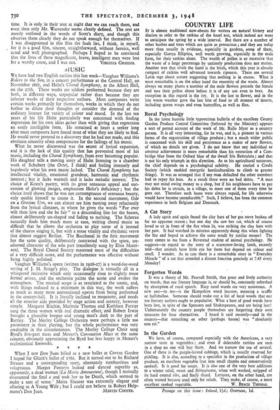MUSIC WE have had two English rarities this last week—Vaughan
Williams's Riders to the Sea, in a concert performance at the Central Hall, on November 26th, and Hoist's Choral Symphony, at the Albert Hall, on the 27th. These works are seldom performed because they are both, in different ways, unpopular rather than because they are inferior works of their respective authors. Most composers write certain works primarily for themselves, works in which they do not bother to dilute their thoughts or consider the demand of the ordinary listener for variety of colour and mood. In the last ten years of his life Hoist particularly was concerned with finding expression for his own ideas 4ether than with giving that expression an easily intelligible form. He remained at heart a seeker long after most composers have found most of what they are likely to find. He would never pretend to a discovery that he had not made, and this obstinate,aincerity often compensates for the failings of his music.
What he never discovered was the secret of lyrical expansion, and it is the lack of this quality that has prevented most of his music including the Choral Symphony, from ever becoming popular. His daughter tells a moving story of Hoist listening to a chamber work of Schubert (the Octet, I think) and feeling intensely and hopelessly what his own music lacked; The Choral Symphony has intellectual vitality, emotional grandeur, harmonic and rhythmic interest ; but it lacks warmth and it lacks melodic interest. The choice of Keats's poetry, with its great sensuous appeal and suc- cession of glowing images, emphasises Hoist's deficiency ; but the choice itself shows that he was not contemptuous of sensuous beauty, only unable himself to create it. In the second movement, Ode on a Grecian Urn, we can almost see him turning away reluctantly from the lyrical climaxes, as where he gives the words "For ever wilt thou love and she be fair" to a descending line for the basses, almost deliberately un-shaped and fading to nothing. The Scherzo naturally finds him much more at ease, writing choral music so difficult that he allows the orchestra to play some of it instead of the chorus singing it, but with a tense vitality and rhythmic verve that almost suggest Berlioz. The Bacchanal in the first, movement has the same quality, deliberately contrasted with the spare un- adorned character of the solo part (excellently sung by Elsie Morri- son). The Royal Choral Society mastered most of the difficulties of a very difficult score, and the performance was effective without being highly polished.
Vaughan Williams's opera (written in 1926-27) is a word-for-word setting of J: M. Synge's play. The dialogue is virtually all in a whispered recitative which only occasionally rises to slightly more formal arioso, and the orchestra paints the scene and evokes the atmosphere. The musical scope is as restricted as the scenic, and, - with things reduced to a minimum in this way, the work suffers as much as many more conventional operas from being performed in the concert-hall. It is literally inclined to monotony, and needs all the exterior aids provided by stage action and scenery, however simple. Margaret Ritchie, Marjorie Thomas and Kathleen Ferrier sang the three women with real dramatic effect, 'and Robert Irwin brought a plausible brogue and young man's dash to the part of Bartley. The Morley College Orchestra were perhaps a little too prominent in their playing, but the whole performance was very creditable in the circumstances. The Morley College Choir sang Byrd's five-part mass and Mozart's Coronation Mass at the same concert, obviously appreciating the Byrd but less happy in Mozart's ecclesiastical fireworks. * * * * When I saw Don luan billed as a new ballet at Covent Garden I hoped for Gluck's ballet of 1761. But it turned out to be Richard Strauss and a corresponding story, alternately rumbustious and voluptuous. Margot Fonteyn looked and danced superbly as, apparently, a dead woman (La Morte Amoureuse), though I mentally discounted the final e and took her to be-Death, which seemed to make a sort of sense. • Moira Shearer was extremely elegant and alluring as A Young Wife ; but I could not believe in Robert Help-


































 Previous page
Previous page